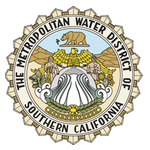Metropolitan Completes Pipeline Repairs Ahead of Schedule
More than 4 million people affected by shutdown can now resume outdoor watering
LOS ANGELES–(BUSINESS WIRE)–Residents and businesses in portions of Los Angeles County can resume limited watering outdoors – with conservation clearly in mind – after the Metropolitan Water District of Southern California completed urgent repairs on a major pipeline ahead of schedule, the agency announced today.
About 4 million people were called upon to stop outdoor watering for up to 15 days starting Sept. 6, while Metropolitan shut down its 36-mile Upper Feeder pipeline, a primary conduit of Colorado River water into Southern California, to repair a leak. Crews working around the clock were able to make the repairs and fully transition the pipeline back into service, nearly two days ahead of schedule. In response to the conservation call, Metropolitan estimates residents and businesses in the affected areas reduced water demands by about 30 percent during the shutdown.
Metropolitan Chairwoman Gloria D. Gray said the savings were vital for preserving extremely limited State Water Project supplies, the region’s other imported water source, which these areas were relying on while repairs were made.
“We know it wasn’t easy to heed our no-outdoor-watering call, particularly during the extreme heatwave the region experienced early in the shutdown, but Southern Californians stepped up their water-saving efforts again, as they have in the past, to help us through this critical shutdown,” Gray said.
After a leak was discovered in the pipeline earlier this year, Metropolitan made a temporary repair and began operating the pipeline at a reduced capacity while a more permanent solution was developed. Once district crews manufactured an expansion joint to replace the leaking pipeline section, Metropolitan scheduled the shutdown to install the longer-term fix and avoid the risk of a critical failure.
“I want to thank the crews who worked tirelessly to complete the project ahead of schedule,” said Metropolitan General Manager Adel Hagekhalil. “This shutdown also required an extraordinary amount of coordination, and we wouldn’t have been successful without the public’s water-saving help and the cooperation and support of our affected member agencies.”
“Now that this critical repair is complete, all Southern Californians must still continue saving as much water as possible to help our region through this ongoing historic drought,” Hagekhalil said.
Metropolitan’s member agencies under this urgent call were the cities of Beverly Hills, Burbank, Glendale, Long Beach, Pasadena, San Fernando, and Torrance, as well as Central Basin Municipal Water District, Foothill Municipal Water District, Three Valleys Municipal Water District and West Basin Municipal Water District.
The Metropolitan Water District of Southern California is a state-established cooperative that, along with its 26 cities and retail suppliers, provides water for 19 million people in six counties. The district imports water from the Colorado River and Northern California to supplement local supplies, and helps its members to develop increased water conservation, recycling, storage and other resource-management programs.
Contacts
Rebecca Kimitch, (213) 217-6450; (202) 821-5253, mobile, rkimitch@mwdh2o.com
Maritza Fairfield, (213) 217-6853; (909) 816-7722, mobile, mfairfield@mwdh2o.com



